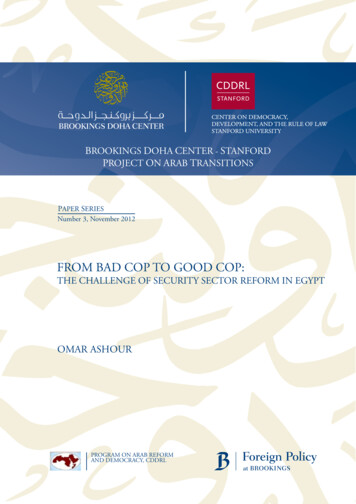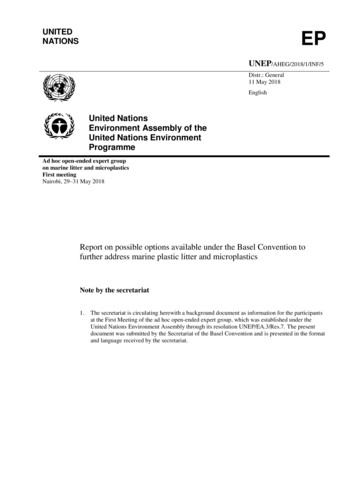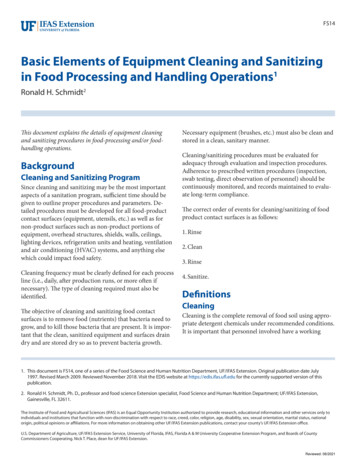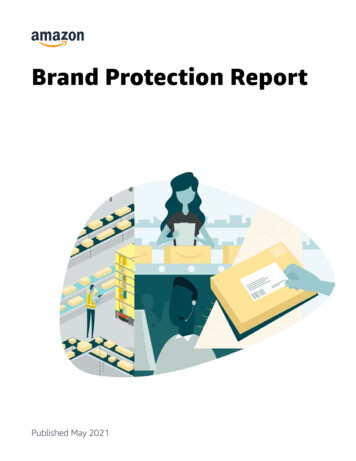
Transcription
CENTER ON DEMOCRACY,DEVELOPMENT, AND THE RULE OF LAWSTANFORD UNIVERSITYBROOKINGS DOHA CENTER - STANFORDPROJECT ON ARAB TRANSITIONSPAPER SERIESNumber 3, November 2012FROM BAD COP TO GOOD COP:THE CHALLENGE OF SECURITY SECTOR REFORM IN EGYPTOMAR ASHOURPROGRAM ON ARAB REFORMAND DEMOCRACY, CDDRL
FROM BAD COP TO GOOD COP:THE CHALLENGE OF SECURITY SECTOR REFORM IN EGYPTEXECUTIVE SUMMARYSuccessful democratic transitions hinge on theestablishment of effective civilian control of thearmed forces and internal security institutions. Thetransformation of these institutions from instruments of brutal repression and regime protectionto professional, regulated, national services – security sector reform (SSR) – is at the very center ofthis effort. In Egypt, as in other transitioning Arabstates and prior cases of democratization, SSR isan acutely political process affected by an array ofdifferent actors and dynamics. In a contested andunstable post-revolutionary political sphere, thereform of Egypt’s security sector requires urgentattention.gence within the police force of a cadre of reformist officers is also encouraging and may help shiftthe balance of power within the Ministry of Interior. These officers have established reformist organizations, such as the General Coalition of PoliceOfficers and Officers But Honorable, and begun topush for SSR themselves. The prospects for implementing these civil society and internal initiatives,however, remain uncertain; they focus on admirable ends but are less clear on the means of implementation. They also have to reckon with strongelements within the Ministry of Interior – “al-Adly’s men” (in reference to Mubarak’s longstandingminister) – who remain firmly opposed to reform.Egypt’s revolution of January 2011 was sparked bythe brutality of deposed president Hosni Mubarak’spolice and security forces. The most notorious andfeared divisions of this security apparatus, StateSecurity Investigations (SSI) and the Central Security Forces (CSF), quickly became the target ofrevolutionary actors across the political spectrum.The SSI’s longstanding record of unlawful detentions, disappearances, and systematic torture waswell known; its “Human Rights Unit” was taskednot with protecting rights, but monitoring and repressing rights activists. The CSF, meanwhile, wasseen as the armed enforcer of the regime’s will –stuffing ballot boxes or quelling demonstrations asneeded.Government-led security sector reform initiativeshave proved similarly problematic. After his appointment as minister of interior in March 2011,Mansour Issawi sacked hundreds of generals anddisbanded the SSI. However, many have criticizedhis reforms as cosmetic – the new National Security Apparatus continues many of the SSI’s practices, and officers’ past abuses remain largely unpunished. From January 2012, a new parliamentdominated by former (largely Islamist) dissidents– themselves victims of police brutality – took upthe cause of SSR and approved amendments tothe Law on the Organization of the Police. Again,though, there were criticisms of the reforms as insufficiently comprehensive, and the work of theparliament was in any case cut short when the bodywas disbanded by a Constitutional Court ruling.The cause of overhauling these institutions toensure effective governance, oversight, and accountability has been taken up by a range of stakeholders since the revolution, with varying degreesof success. Civil society actors have taken the lead,and one promising project is the National Initiative to Rebuild the Police Force (NIRP). The emer-The major obstacle to successful security sectorreform in Egypt’s transition, however, has been therole played by the Supreme Council of the ArmedForces, an inherently SSR-averse body which retained executive powers until June 2012. Unlike inTunisia and Libya, pro-revolution forces in Egyptdid not enjoy any real power in the immediate after-ABOUT THe AUTHOROmar Ashour is a nonresident fellow at the Brookings Doha Center and the Director of the Middle East GraduateStudies Program at the Institute of Arab and Islamic Studies, University of Exeter. He is the author of The De-Radicalization of Jihadists: Transforming Armed Islamist Movements.1
FROM BAD COP TO GOOD COP: THE CHALLENGE OF SECURITY SECTOR REFORM IN EGYPTmath of their uprising, and the country’s first freelyelected parliament had a limited mandate.The election of President Muhammad Morsi and hisbold attempt to tilt the balance of power betweenthe civilian administration and the military establishment have dealt a significant blow to opponentsof security sector reform. By reclaiming executivepowers for the presidency and culling Egypt’s topmilitary brass and security sector chiefs, he has removed major obstacles to civilian control of thearmed forces and security apparatuses. Furthermore,the president’s choices of ministerial appointmentswill allow him to advance a pro-reform agenda inkey areas through ministries that wield significant, ifsoft, power, such as the Ministry of Justice and theMinistry of Parliamentary and Legal Affairs.The paper’s final section includes recommendedsteps to be taken as the newly-elected governmentseeks to extend civilian control of the security establishment – an initiative that will be an important testboth of Morsi’s administration and of Egypt’s democratic transition. These recommendations includethe following: Establish a presidential committee for security sector reform. This committee, composedof a range of reformist forces, should have thespecific responsibility and powers to reform andrestructure the Ministry of Interior and shouldanswer directly to the president. Establish proper oversight and monitoringof the security sector. The Internal MonitoringSector (al-Taftish) should be empowered to domore than just investigating officers in reactionto complaints. It should be given a mandate tomonitor and regularly appraise the performanceof police officers. Oversight by external bodies,including an independent ombudsman and a representative prosecutor in each major police station, should be regulated in a new police law. Cleanse the Ministry of Interior and PublicProsecutor’s Office through presidentiallyappointed committees. The Ministry of Interior must be cleansed of officers who committedtorture, murder, extra-judicial killings, and other2crimes, especially in the CSF, the SSI, and theSSI’s successor the National Security Apparatus (NSA). It will also be necessary to cleansethe Public Prosecutor’s Office and State SecurityProsecution of officials who condoned or participated in abuses, including doctoring evidence,faking charges, or accepting “confessions” extracted via torture. Change the promotion criteria within theMinistry of Interior. A meritocratic system inwhich promotion is determined by performance,training, and qualifications should be establishedand elaborated in the new police law. Conduct a comprehensive review of PoliceAcademy training curricula and systems. Thereview should focus on de-militarization of thepolice, as well as on altering training materials toreflect concepts of human security (as opposed tostate security) and police functions as a “service”to society. Restructure and downsize the Ministry of Interior. Non-security functions and departmentsshould be separated from the Ministry of Interior.Activities for which the ministry is currently responsible such as Passport Administration, CivilRecords, Civil Defence, pilgrimage organization,and others, should be placed under different ministries. At the same time, the ministry should stopintervening in affairs outside its mandate, including media, culture, and academia. Provide the Central Security Forces with comprehensive training in non-lethal riot controltactics. Internationally approved training procedures should be adopted, and the equipment necessary for effective riot control should be supplied. Draft a new police law to replace the Police Institution Law No. 109 of 1971. The law shouldbe drafted while legislative powers are temporarily held by the President (until a new parliamentis seated). It should reflect all the aforementionedrecommendations.
FROM BAD COP TO GOOD COP: THE CHALLENGE OF SECURITY SECTOR REFORM IN EGYPTINTRODUCTIONThe January 25 Egyptian revolution was sparked bypolice brutality. The context was set by the murderof internet activist Khaled Said in June 2010 by twopolicemen, followed by the brutality of both officers and plain-clothed “thugs”2 during the fraudulent parliamentary elections later that year. January 25 was also Egypt’s Police Day. The date wasno accident; “[We wanted] to ruin their party likethey ruined our lives,” one activist from the April 6movement3 said. Indeed, for many revolutionaries,the police were the main line of defense protecting the regime of President Hosni Mubarak. “Wehad to break it I wish there was another way butthere wasn’t Now we have got to fix it,” said ayoung activist on the way to Tahrir Square on January 28, 2011.4 Indeed, following the removal ofMubarak, security sector reform became an immediate objective of both revolutionary and reformistforces, regardless of ideological or political affiliations.By March 2011, accumulated grievances led to another confrontation, this time with State SecurityInvestigations (SSI), the domestic intelligence service. The evening of March 5 in Cairo was reminiscent of Berlin on January 15, 1990. Thousandsof Egyptian protesters stormed SSI headquartersnot only in Cairo but also in Alexandria, Assyut,and other cities, just as German protesters had doneto the offices of the hated Stasi. In both cases, theprotests had been sparked by state security officersdestroying files that documented their institutions’corruption and repression. Demonstrators gathered,attempting to safeguard what remained of the incriminating evidence. Details of secret graveyardsand almost medieval dungeons, files of politicaldissidents held for more than a decade, names ofjudges who helped to fix elections, and lists of informants – celebrities, religious figures, talk-showhosts, and “opposition” leaders – were all capturedon camera and uploaded onto popular websites.Torture rooms and equipment were captured oncamera in every SSI building stormed by protesters. Even for apolitical Egyptians, the sheer volumeand graphic detail of the released files were shocking. Although unlawful detentions, kidnappings,disappearances, systematic torture, andbeen documented by both human rightstions and Egyptian courts over the lastcades, most media outlets never daredsuch “red lines” while Mubarak ruled.rape hadorganizathree deto crossThis paper focuses on the politics of police reformand oversight in Egypt, addressing several dynamics that affect such efforts. These include the roleplayed by the police and domestic intelligence(SSI) in provoking and sustaining public outragebefore and during revolution; the reversal wherebythose most oppressed by the SSI are now the strongest force in the country’s new democratic politics; and the emergence of individuals and groupsof police officers who are trying to reform a repressive system. The paper begins with an overview ofthe concept of security sector reform, drawing onlessons learned elsewhere. It goes on to discuss thehistorical relationship between the police and politics in Egypt. The third section outlines some of thereform initiatives proposed by stakeholders: civilsociety groups, reformist officers, the Ministry ofInterior, the dissolved parliament, and the presidency. The study concludes with an assessment ofsome of the obstacles to SSR in Egypt and policyrecommendations for the country’s first elected civilian president, Muhammad Morsi.SECURITY SECTOR REFORM: PRINCIPLES,OBJECTIVES, AND LESSONSSecurity sector reform (SSR) can be described as“the transformation of the security system whichincludes all the actors, their roles, responsibilitiesand actions, so that it is managed and operated ina manner that is more consistent with democraticnorms and sound principles of good governance,and thus contributes to a well-functioning securityframework.”5 The philosophy behind SSR is rootedin human security: the idea that the primary objective of the security apparatus is the security of theindividual citizen, not that of ruling regimes. It is anidea that contrasts distinctly with the reality underMubarak, where the daily threat for many lawabiding citizens was not al-Qaeda or the Mossad,but the Egyptian security establishment itself.3
FROM BAD COP TO GOOD COP: THE CHALLENGE OF SECURITY SECTOR REFORM IN EGYPTIdeally, the reform process should embrace allbranches of the security sector, from the armedforces to the customs authorities. The focus of thispaper, however, will be limited to the Ministry ofInterior, which in Egypt includes the police, paramilitary forces (Central Security Forces), and domestic intelligence services (SSI, now renamed theNational Security Apparatus).Two core objectives of SSR processes are critical inthe case of Egypt:61. Establishment of effective governance, oversight, and accountability in the security system.2. Improved delivery of security and justice services.7To achieve those objectives, any comprehensiveSSR process must include a number of key initiatives. First, oversight and accountability must beimproved, whether internally through the executivebranch, through parliamentary oversight and legislation, or through the judiciary. Civil society actors,and indeed individual citizens, can also play a rolein enhancing accountability through independentmonitoring mechanisms such as public complaintscommissions, independent ombudsmen, or inspectors-general.8 Defining a clear legal framework andmandate for the security services that integrates established human rights norms is also of crucial importance.Within the security services themselves, there is aneed for enhanced capacity building through improved police training, staff development, and personnel policies. There must also be an emphasis ondecentralization and on “civilianizing” the policeforce through measures such as ensuring civilian leadership, reforming ranking structures, andeven redesigning uniforms. Ultimately, the security services must build a new, de-politicized identity, based on a strong professional and meritocraticculture.These elements constitute the pillars of securitysector reform and the core of successful democratization in several other transitioning countries. InSpain, such steps were gradually introduced after4the death of General Francisco Franco in November 1975, leading up to the transfer of power tothe Socialist Party following the country’s landmark 1982 elections.9 In South Africa, a comprehensive reform program for national defense wasintroduced in the White Papers of October 1994.This included the establishment of a new professional identity for intelligence personnel, bolsteredby a code of conduct stressing compliance withdemocratic values, respect for human rights, andadherence to the principle of political neutrality.10More recently, in Indonesia the “New Paradigm,”a framework for the democratization process, emphasized the de-militarization of the police andparliamentary oversight over the security services.The latter measure was introduced under PresidentAbdurrahman Wahid (1999-2000) and producedthree parliamentary commissions that monitor theIndonesian security apparatus.11 In Georgia, the demilitarization of police was partly implemented between 2004 and 2005; the interior minister, deputyinterior minister, and chief of domestic intelligenceare now all civilians. Additionally, the interior ministry signed a memorandum on the monitoring ofdetention centers with a human rights ombudsman.12 In Chile, following the repressive period ofGeneral Augusto Pinochet (1973-1990), the Senateapproved the creation of a civilian National Intelligence Agency (ANI) in 2003 and, pursuant to a lawenacted in 2004, security agencies have to provideall requested information to that body.13Beyond these transitional cases, highly professional security agencies in consolidated democraciesare monitored by external bodies like the Intelligence and Security Committee in the United Kingdom or the Security Intelligence Review Committee (SIRC) in Canada. Typically, these bodies havethe authority to examine information concerningthe activities of intelligence agencies and reportback to the government or parliament.In the context of other Arab states undergoing transitions, security sector reform is similarly critical and, as in Egypt, remains a sphere of political contention. In Tunisia, the country that sparkedthe Arab Awakening, the current interior ministerAli Larayedh is a civilian who was himself a tor-
FROM BAD COP TO GOOD COP: THE CHALLENGE OF SECURITY SECTOR REFORM IN EGYPTture victim during the sixteen years he spent in jailunder the Ben Ali regime. The Tunisian Ministryof Interior laid out a comprehensive roadmap forreforming the country’s security sector in a whitepaper entitled “Security and Development: AWhite Paper for Democratic Security in Tunisia.”The paper discussed turning the security sector“from a police order to a police service that can respond urgently to the new challenges of crime.”14However, leaders of the ruling Islamist al-NahdaParty believe the White Paper was produced byformer regime figures within the Ministry of Interior who are not necessarily pro-reform.15 “Thereare some good elements. But it offers no comprehensive reform,” said Amer Larayedh, the head ofal-Nahda’s Political Bureau.16Indeed, resistance to reform is evident withinthe ranks of the ministry, as the case of ColonelMoncef al-Ajimi demonstrates. Al-Ajimi, the director of the ministry’s “Intervention Forces,” wascharged with firing on peaceful protesters in thetowns of Thala and Qasarin during the revolution.In the course of al-Ajimi’s trial, Minister Larayedhattempted to remove the colonel from his position. In reaction, hundreds of policemen from theBouchoucha barracks physically blocked access toal-Ajimi and then organized a strike to protest hisattempted dismissal.17 Around 13,000 members ofthe Intervention Forces withdrew from key locations in several Tunisian cities and returned to theirbarracks. “We will not be a scapegoat for the families of the martyrs,” said one of the protesting policemen.18 As a result, Larayedh was forced to keepal-Ajimi in place at the ministry. In June, a militarycourt found al-Ajimi not guilty. Though Tunisia’smilitary prosecutor will appeal the verdict,19 the incident revealed the level of internal resistance toreform faced by the Nahda-led government.In Libya, successful security sector reform, alongside demobilization, disarmament and reintegration (DDR) processes, could well turn the oil-producing country into a democratic Dubai. If it fails,however, we are likely to see further incidents suchas the September 11 attacks on the U.S. consulatein Benghazi and even the possibility of broad civilconflict. The decentralized nature of Libya’s “liberation army” has had several important implicationsfor the country’s transition. On the positive side, itwas in many ways a “people’s army” – popular,legitimate, and inclusive. It avoided many of thepotential depredations which a single, hierarchicalrebel army might have inflicted on local populations. At the same time, however, the absence ofa clear command-and-control structure meant thatthe units “coordinated” but did not “obey.” This ledto a long list of rogue acts, the most shocking beingthe murder of rebel commander General Abd al-Fatah Younis by his own side in July 2011. Since theremoval of Qadhafi, rival provincial militias haveengaged in skirmishes in Tripoli and elsewhere,and these militias continue to exert some controlover the executive branch.20The SSR process, however, does show some promise. The appointment of Salem al-Hasi as the headof the Libyan intelligence agency, the Foreign Security Apparatus (FSA), makes him the first civilian opposition figure to lead an Arab intelligenceservice. Al-Hasi was a member of the armed wingof the National Front for the Salvation of Libya(NFSL) and spent more than two decades in exilein the United States. “All of the Arab intelligenceservices were there to protect the regime and oppress citizens. I will change that. The Libyan intelligence will be under the control of the electedexecutive and the direct oversight of the legislative assembly,” al-Hasi said upon taking his post.21Whether he will succeed or not is another matter.Accusations have been levelled against al-Hasiand his agents for allegedly tapping phones andelectronically monitoring Qadhafi loyalists usingequipment inherited from the former regime. TheGeneral National Congress and future parliamentswill need to craft laws for oversight and control ofthe security and intelligence apparatuses, as well asa clear mechanism for enforcing that control. Suchsteps will require the help of the UN Mission inLibya (UNSMIL) as well as independent experts.Beyond its technical, organizational, and administrative dimensions, SSR is a highly political process. Indeed, that political dimension can dictatethe direction and success of the entire project. SSRprocesses usually result from, and succeed becauseof, major shifts in the balance of political power.Ultimately, successful SSR separates democra5
FROM BAD COP TO GOOD COP: THE CHALLENGE OF SECURITY SECTOR REFORM IN EGYPTcies from autocracies; genuine democratization inEgypt hinges on the effective reform of its security sector.EGYPT’S POLITICAL POLICEThe history of police institutions in Egypt goesback to 1805, when Muhammad Ali, the ruler andso-called “founder of modern Egypt,” established asmall department to keep law and order in Cairo. In1857, this department became the Ministry of Interior. Today, the ministry comprises a massive bureaucracy employing more than 1.5 million people:officers, petty-officers, soldiers, conscripts, andcivilian administrators. This labor force includesmore than 831,000 full-time jobs and a complexnetwork of more than 300,000 paid informants andex-convicts (for information gathering).22The Ministry of Interior’s involvement in Egyptianpolitics has been well documented. Historically, theposition of interior minister has been manipulatedby different political forces. Following the 1919revolution, Wafdist prime minister and liberal revolutionary leader Saad Zaghloul held the positionin 1924 and used its authority against his politicalopponents. Following the popular coup of 1952,Gamal Abdel Nasser held the position and kept iteven when he became prime minister the following year.Meanwhile, two major police sectors – State Security Investigations (SSI) and the Central SecurityForces (CSF) sectors – have had significant impacton the Egyptian political scene. The predecessorsof the SSI date back to before 1952, when the “Political Bureau” was in charge of reporting and occasionally cracking down on dissidents. There is nocomparison, however, between the influence of theSSI and that of the Political Bureau. After the success of their July 1952 coup, the victorious “FreeOfficers” dissolved the Political Bureau, which hadbeen reporting on them in the years prior. Once theyfaced political opposition and worker strikes in theindustrial town of Kafr al-Dawar, however, theydecided to reestablish a similar state security bodywith the help of senior officers from the old Politi6cal Bureau. On August 22, 1952, only weeks afterthe July coup, the General Investigation Apparatuswas established. It was renamed the General Administration of State Security Investigations (SSI)in 1971 when Anwar al-Sadat assumed the Egyptian presidency. By the time of Mubarak’s ascentto the presidency in 1981, the SSI had become themost powerful police sector in the country. It employed an estimated 100,000 individuals, and theinfluence and authority of its captains exceededthat of generals in other sectors.Today, the mandate and internal organization ofthe SSI remain vague. At time of writing, the SSI‘ssuccessor agency the National Security Apparatus(NSA) is the only sector whose internal structure isundisclosed on the Ministry of Interior’s website.However, a clear organizational framework can bedrawn from the documents confiscated by activistswho stormed SSI headquarters following the revolution, as well as from interviews with former officers.23 From these documents, it becomes clear thatthe mandate of the SSI was almost exclusively focused on subduing, neutralizing, annihilating, orco-opting dissent.Organizationally, the largest administrative components within the SSI were the “general administration,” organized either by region or by thematic specialization. Each general administrationcontained a number of successively smaller components: “central administrations,” “groups,” andthen “units.” The largest of the general administrations was Extremist Activity,24 whose mandate wasto counter any religious-based activism in the country. (Some officers still refer to it by its former title,Religious Activism, or al-Nashat al-Dini.25) Subunits within Extremist Activity included Countering Brotherhood Activism, Extremist Organizations, and Prison Security (tasked with counteringIslamist political activism in prisons and detentionscenters).Other SSI components that repressed political dissent included the Student Activity Units, the HumanRights Units (whose mandate was to monitor andsuppress human rights activists), the Arab Activism Group (mainly tasked with countering the influence of Arab nationalists), Workers Units, and
FROM BAD COP TO GOOD COP: THE CHALLENGE OF SECURITY SECTOR REFORM IN EGYPTthe Sectarian Activity Group (which was mandatedwith dealing with Christian activists and includeda Church Activity Unit). In addition, there was theGeneral Administration for Foreign Activity (withunits for Europe and America) and an ElectronicMonitoring Group (responsible for monitoring internet activists, with a unit specializing in hackingwebsites and blogs), and finally the state-of-the-artCounter-Terrorism Group.26lence outside. We would ask the representatives ofthe candidates to leave. Then the stuffing begins .Back in 1995 only one officer, out of the 500 or so,refused to participate. He was a Major back then.His name is Omar Afifi.”31When asked about the incident, Colonel Afifi said,“I am not going to tell you that I was a hero AlAdly ordered us not to carry a gun or a police IDto avoid scandals. This meant that if the rigged ballots started falling from the huge black jackets theygave us, I would be torn apart by angry voters. Iconcluded that al-Adly and the police commanders would sacrifice the officers like insects andfor the dirtiest cause. This was a turning point forme.”32Whereas the SSI in general stands accused of systematic torture, kidnapping, and illegal detentions,the majority of these accusations have been directed at the Extremist Activity administration andCounter-Terrorism Group (CTG). These groupshave also been accused of extrajudicial killingsand ordering assassinations. One former SSI officer described an incident indicative of the institution’s casual abuse of power: “We arrested thisguy and Extremist Activity and CTG officers gotinto an argument. They got the information theywanted, but neither wanted the guy. Then a CTGofficer ended the argument. He pushed the guy outthe window. It was Ramadan and he was late for thesuhur meal27 The guy died instantly and it wasregistered as resisting arrest . They laughed aboutit afterwards.”28 CTG officers were also accused bya government-appointed fact-finding commissionof sniping at protesters in and around Tahrir Squarein January 2011. At time of writing, none had beentried.29The other relevant police sector is the Central Security Forces (CSF). It was established in 1969 toaddress the police’s limited capacity to quell demonstrations following the military defeat of June1967. Back then, the CSF was composed of 189 officers and 11,690 soldiers.33 On January 25, 2011,the CSF had more than 300,000 officers, soldiers,and conscripts within its ranks.34 If the SSI wasthe brains protecting the regime, the CSF was itsmuscle and iron fist. The arms used by the CSF reflect the breadth of its mandate: they range fromarmored vehicles and sniper rifles to iron bars andelectric prods. “This was Mubarak’s internal armyagainst the people,” said one activist interviewed.35Additionally, SSI, Criminal Investigations, andCSF officers have regularly been accused of rigging elections, stuffing ballot boxes, and terrorizing voters since the first parliamentary electionsunder Mubarak in 1984. Lt. Colonel MahmoudAbd al-Nabi, a co-founder of the Officers But Honorable (OBH) organization, outlined the detailsof the rigging process, in which he had participated since 1995.30 “Habib al-Adly, head of Cairo’s General Security Directorate back then, askedaround 500 officers to carry between 200 to 400pro-NDP ballots and to stuff the boxes with them.The SSI and CSF officers were to provoke someviolence outside the voting center for distraction.Then the Criminal Investigation officers inside thevoter center would shut it down because of the vio-The history of the CSF is not, however, one of totally unswerving loyalty to the Mubarak regime. Ina mutiny in 1986, CSF soldiers protested ill-treatment in camps and a possible increase in the periodof conscription (from three to five years). The protesters burned camps and nearby tourist hotels, andclashed with army forces. The mutinous CSF conscripts were defeated in a few days, but hundredswere killed. In the immediate aftermath, InteriorMinister General Ahmed Rushdi was sacked, newconscription regulations were enforced, and bettertreatment was ordered. But that confrontation deepened the mistrust between the armed forces and theCS
FROM BAD COP TO GOOD COP: THE CHALLENGE OF SECURITY SECTOR REFORM IN EGYPT Omar Ashour is a nonresident fellow at the Brookings










